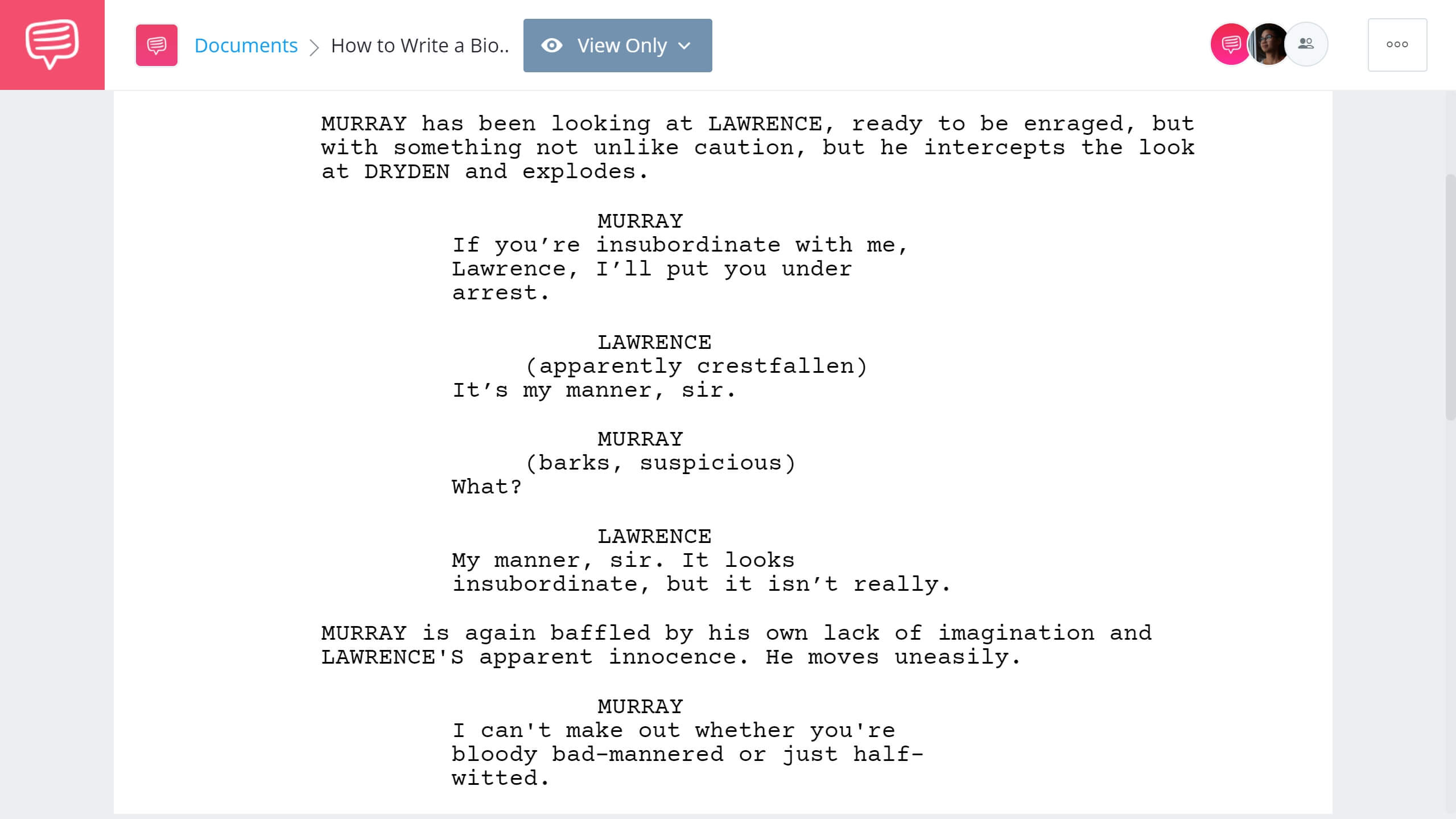Writing a biopic screenplay can present an enormous challenge for even the most veteran screenwriters. That’s because biopics often involve legal and circumstantial challenges that aren’t an issue with other forms. Don’t fear though: we’re going to show you how to write a biopic screenplay step-by-step. By the end, you’ll be ready to write a biopic screenplay either as a spec, or a script intended for production.
How to Write a Biopic
Start with a subject
Before we break down how to write a film bio, perhaps we should ask the question: what is a biopic? A biopic, short for biographical picture, is a movie about a person’s life. The primary subject of a biopic doesn’t have to be a celebrity; it could be a mailman who saved a child from a burning building, an accountant who accidentally discovered an embezzlement scheme, or a high school football coach who rallied a small-town together – it doesn’t matter.
The only thing that does matter is that your primary subject did something extraordinary within the setting of your story.
The vast majority of biopics are about people who are at least somewhat famous. That doesn’t mean your biopic has to be about Winston Churchill or some other legendary figure. It can also be about somebody who achieved fame for doing something extraordinary in their field. Take Susannah Grant’s Erin Brockovich screenplay for example: the title subject became famous for her role in the Pacific Gas and Electric class action lawsuit.
How to Write a Biopic Screenplay • Erin Brockovich Trailer
Erin Brockovich is proof that you can write a viable biopic screenplay about an unknown subject so long as they were involved in something extraordinary. Erin Brockovich grossed nearly five times its budget at the box-office, was nominated for four Academy Awards and won Best Actress for Julia Roberts.
How to Write a Film Bio
Research is everything
After you decide on a subject for your biopic, you should begin formal research. Remember: it is of the utmost importance that you find reputable sources during your research. But what is a reputable source?
Well, it’s never a bad idea to start with the horse’s mouth. Find out everything you can from the primary subject whether by talking to them, watching interviews or reading their content. If they’re dead, try to contact business contacts, estates, etc. When you get information on a subject from someone closely associated with them, we call that a primary source.
One of the most prolific writers of biopics today is Aaron Sorkin and his perspective on this matter can teach us a lot about how to conduct research. Listen to him explain how he researched for Steve Jobs in the clip below.
How to Write a Biopic Screenplay • Aaron Sorkin on How to Write a Biopic
“Obviously I’m inventing dialogue, I wasn’t there when they were really having these conversations so I’m doing a certain amount of making it up. But I can’t imply that someone was a fall-down drunk when they weren’t or someone was mean to kittens when they weren’t and I can’t really invent plot that much,” Sorkin said on writing biopics.
There’s a reason why I say that research is everything – you simply can’t make up major aspects of a biographical story. Like Sorkin said, you can’t imply someone was something they weren’t and you can’t invent false plot points. If you do that, you run the risk of being accused of defamation or libel.
So the number one rule of thumb is to source EVERYTHING. If somebody asks “did this really happen?” you need to be prepared to show them a source.
When Aaron Sorkin wrote The Social Network script, he used Mark Zuckerberg’s deposition hearings with Eduardo Saverin and the Winklevoss twins as primary sources.
For Moneyball, Sorkin stuck mostly to the research provided in the book of the same name by Michael Lewis and co-screenwriter Steven Zaillian.
There are a myriad of strategies to use when researching a biopic, but remember that the number one most important thing is organization.
Writing a Biopic
Write the script
Now that you’ve completed your research, dotted your i’s and crossed your t’s, you’re ready to start writing the script. Before you begin, review the proper screenplay formatting guidelines so that your script will comply with the industry standards. You can reference back to this article throughout writing to make sure everything is in tip-top shape.
Biopic genre screenplays are generally 90-120 pages, but some are much longer than the industry standard. We imported the Lawrence of Arabia script into StudioBinder’s screenwriting software to get a better idea of the breadth of an epic biopic. In this excerpt, you’ll notice that dialogue plays an essential role in relaying exposition and character.
How to Write a Film Bio • Read the Lawrence of Arabia Script
Two things should be noted about the Lawrence of Arabia script: the first is that if you’re serious about writing a biopic screenplay, you should read it. The second is that this draft is the shooting script – so be mindful that all of the camera movements and transitions you see shouldn’t be in your screenplay. That may be a relief to hear, considering that the Lawrence of Arabia shooting script is over 260 pages long!
Now that we’ve taken a look at a classic biopic, let’s look for inspiration from something more contemporary. Steven Zaillian has written a few of the greatest biopics of all-time, like American Gangster, Moneyball and Schindler’s List – but his 2019 The Irishman script might be the most famous of them all.
Let’s take a look at a quick video that explains some of Zaillian’s strategy for writing the script for The Irishman.
How to Write a Biopic Screenplay • The Irishman Screenwriting Strategy
As Zaillian says, “I had never read anywhere else that Hoffa couldn’t stand for somebody to be late but those details became an important part of scenes.” This teaches us an essential lesson about writing biopics; which is: sometimes we learn essential aspects of character from the most unlikely of circumstances. So as you write, incorporate all the weird intricacies you can find. Say your subject drinks tomato juice every morning – that’s something you want to put in the script. These are things that stick with us because they create specificity.
How to Write a Biopic Screenplay: Step 4
Check your facts and legal options
Now is the point where you have to consider whether you want to leverage your biopic as a “portfolio piece” or a spec script for sale. The good news is that whatever you decide, your decision isn’t binding. No matter what, you’re always going to be able to keep the script in your portfolio to show off to prospective employers. But if you’re dead-set on getting your script in a producer’s hands, here’s what you need to know.
1. Be mindful of optioning
If you choose to adapt your screenplay from a book about a subject, then you’re going to need to get an option. The book publisher technically has the rights to the story and they will need to agree to lease the rights for the film adaptation; whether that’s directly to you or the studio you sold the spec script to.
Biopic Genre Films • What Screenwriters Should Know About Optioning
2. Get the blessing of the subject
No matter which way you cut it, you’re going to want to get the blessing of your primary subject. In the film Stronger, the primary subject Jeff Bauma helped promote the film.
How to Write a Film Bio • Jake Gyllenhaal Playing Jeff Bauma in Stronger
If the subject has passed, then you’re going to want to get the blessing of their estate or closest living relatives.
3. Distribute works cited
It may sound trite to say that you should attach a “works cited” or bibliography with your biopic, but you should attach a works cited or bibliography with your biopic. This will show producers that you took your research seriously.
How to Write a Biopic Screenplay • Why citations are so Important
4. Pursue different avenues
There isn’t just one way to get your biopic produced; there are dozens. Consider submitting your script to organizations like The Black List – there you’ll be able to share your story with other aspiring and professional writers.
How to Write a Film Bio • How an Underground Script List Changed Movies
Contact scholars on the subject in a clear and polite manner – the worst they can do is not respond. And if worst comes to worst, put the script on the back-burner and come back to it later.
UP NEXT
How to Write Everyday
Writing a biopic screenplay requires an insane amount of work. For you to be successful, you need to be a disciplined writer. In this next article, we break down some tips and tricks for becoming a more disciplined writer, by exploring how to build productive habits. By the end, you’ll be ready to write everyday in a surgical manner.

